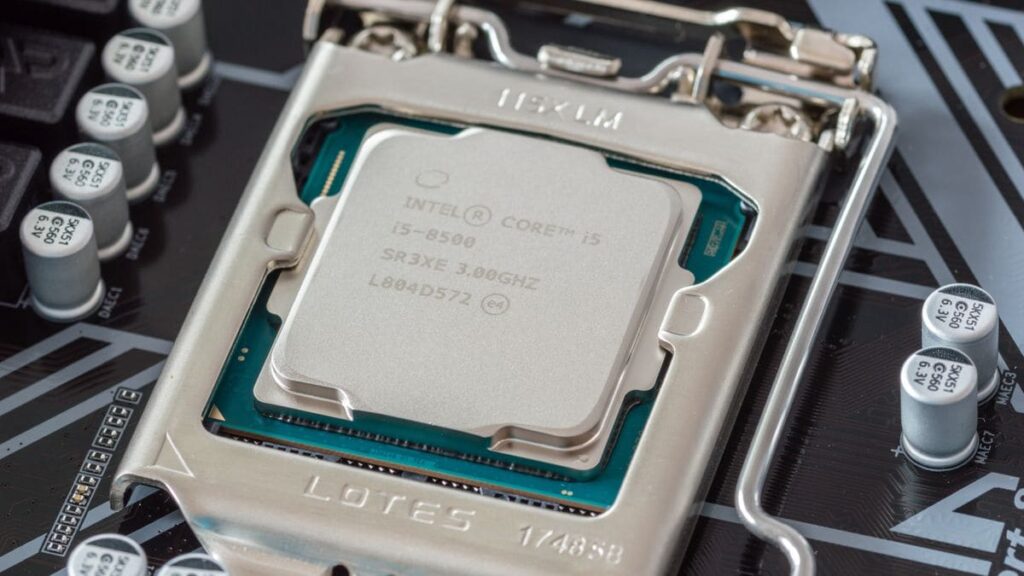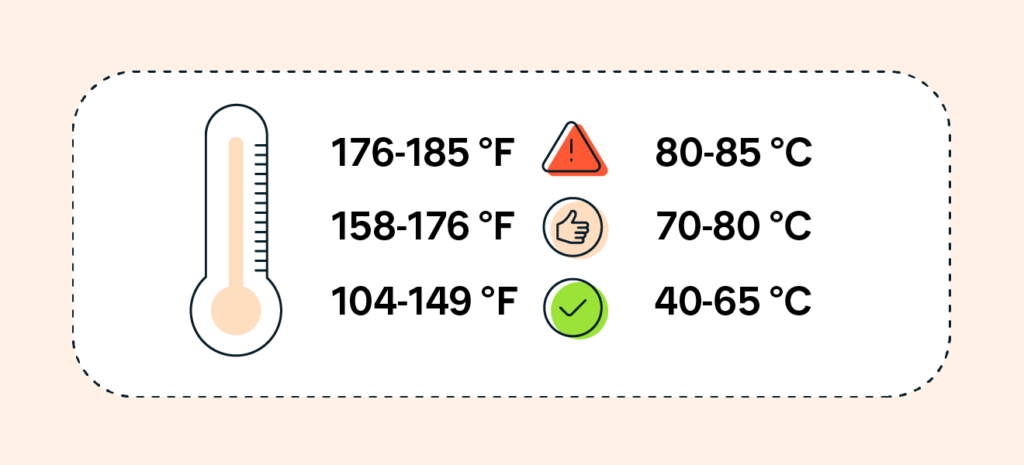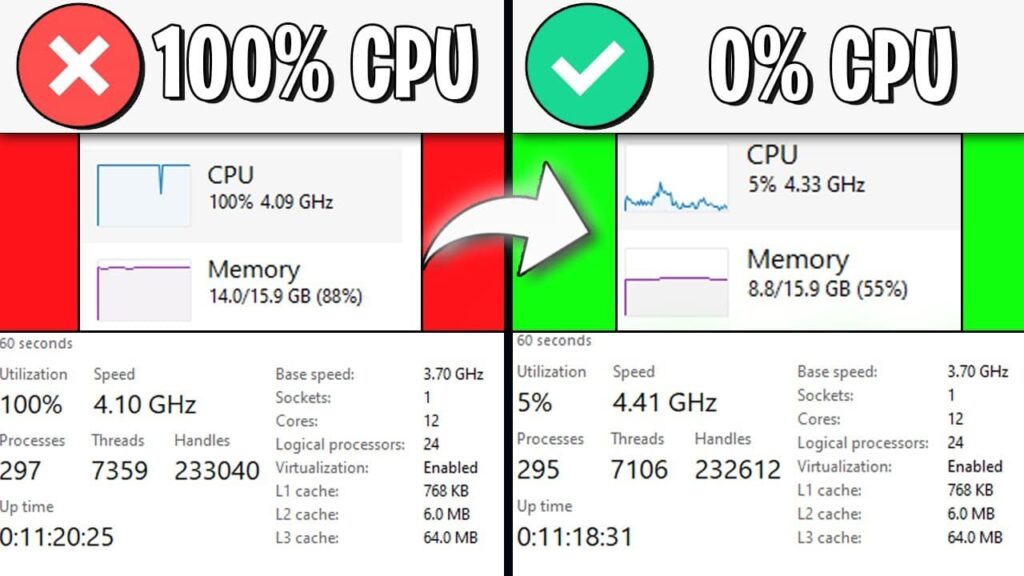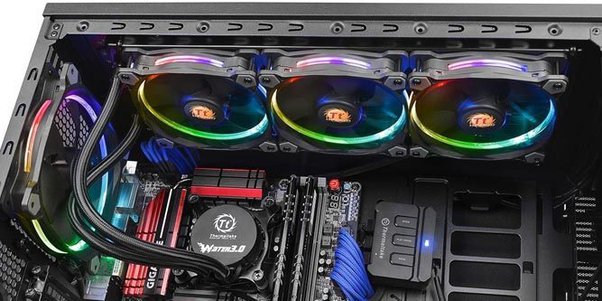CPU core temperatures can rise and fall quickly, which can be confusing. This usually happens due to problems with cooling or software issues. Understanding why this happens can help you keep your computer running well.
When CPU core temperatures rise and fall quickly, it often means there’s a problem with cooling or software. Ensure your computer’s cooling system works well and check for any software issues to keep your CPU stable.
In this article “CPU core temperatures rise and fall impossibly”.
Understand CPU Core Temperature:
What Is A CPU And Its Core?
A CPU (Central Processing Unit) is the brain of your computer. It processes instructions and runs programs. Each CPU has cores, which are like mini-brains inside the CPU. More cores can handle more tasks at once.
How Do We Measure The Temperature Of A CPU Core?
You measure CPU core temperature using software tools that check the heat levels. These programs show the temperature in degrees Celsius or Fahrenheit, helping you monitor if your CPU is getting too hot.

Read: What Is CPU Package Temperature – A Comprehensive Guide Of 2024!
What Are Normal And High CPU Temperatures?
Normal CPU temperatures usually range from 30°C to 70°C (86°F to 158°F) when in use. High temperatures are above 80°C (176°F) and can cause overheating. Keeping your CPU below 80°C is important for its health and performance.
Why Does CPU Temperature Rise And Fall?
Heavy Usage:
Running many programs or games makes the CPU work harder, raising its temperature.
Cooling System:
If fans or coolers are dirty or broken, the CPU can’t stay cool, causing temperature changes.
Room Temperature:
Hot weather or a warm room can make the CPU hotter, affecting its temperature.
Software Bugs:
Some software problems can cause the CPU to overwork, leading to sudden temperature spikes.
What Causes Fast Temperature Changes In A CPU?
Fast temperature changes in a CPU can be caused by running heavy programs, poor cooling systems, sudden changes in room temperature, or software bugs. These factors make the CPU work harder or less efficiently, leading to quick temperature shifts.
How Can I Check And Monitor CPU Temperatures?
You can check and monitor CPU temperatures using software tools like HWMonitor or Core Temp. These programs show real-time temperature readings, helping you keep track of your CPU’s heat levels and ensure it stays within safe limits.

How Do Rapid Temperature Changes Affect My CPU?
Rapid temperature changes can harm your CPU by causing stress and reducing its lifespan. High temperatures can make the CPU work slower or damage it, while sudden cooling can create condensation, potentially leading to hardware issues.
How Can I Fix CPU Temperature Problems?
To fix CPU temperature problems, clean or replace the cooling system, use cooling pads, ensure good airflow in your computer case, and update your software. These steps help keep the CPU cool and working properly.
When Should I Get Help For CPU Temperature Issues?
Get help for CPU temperature issues if your computer overheats often, if temperatures stay high despite cleaning, or if you notice performance problems. A professional can check for deeper issues and fix cooling or hardware problems.
Why Is My CPU Temperature Going Up For No Reason?
Your CPU temperature might rise for no clear reason due to background programs using a lot of resources, dust blocking airflow, or a failing cooling system. Check for these issues to help stabilize your CPU temperature.
What Are Bad CPU Core Temps?
Bad CPU core temperatures are usually above 80°C (176°F). Consistently high temps can cause overheating, damage the CPU, and reduce its lifespan. It’s important to keep the temperature below this level to ensure proper functioning and longevity.

Does Core Temp Affect Performance?
Yes, high core temperatures can affect performance. When the CPU gets too hot, it may slow down to prevent damage, which reduces performance. Keeping temperatures in the safe range helps maintain optimal speed and efficiency.
Read: Can A CPU Die From Overheating – Ultimate Guide For 2024!
Is 90 Degrees Hot For A CPU?
Yes, 90 degrees Celsius (194°F) is quite hot for a CPU. This high temperature can lead to overheating, reduced performance, and potential damage. It’s best to keep your CPU cooler to avoid these problems.
What Temperature Will Damage A CPU?
A CPU can be damaged if it reaches temperatures above 90°C (194°F). Consistently high temperatures can cause overheating, reduce the CPU’s lifespan, and lead to system crashes.
How Long Can A CPU Survive At 90 Degrees?
A CPU can survive at 90 degrees Celsius (194°F) for only a short time before damage occurs. Prolonged exposure at this temperature can shorten the CPU’s lifespan, cause overheating, and lead to system failures.
Is 100 C Bad For The CPU?
Yes, 100°C is very bad for the CPU. At this temperature, the CPU can overheat, leading to potential damage, crashes, or permanent failure. It’s crucial to keep the CPU well below this temperature for safe and efficient operation.

How Often Should I Replace Thermal Paste?
You should replace thermal paste every 2 to 3 years or if you notice high CPU temperatures. Over time, a thermal paste can dry out and lose its effectiveness, making regular replacement important for maintaining good cooling performance.
How Do I Cool My CPU Down?
To cool your CPU down, clean or replace the cooling fans, use additional case fans, apply new thermal paste, and ensure good airflow in your computer case. Keeping your room cool and dust-free also helps maintain lower temperatures.
What Is A Healthy CPU Temperature?
A healthy CPU temperature is usually between 30°C and 70°C (86°F to 158°F) when in use. Keeping temperatures within this range helps ensure your CPU runs efficiently and avoids overheating or potential damage.
Read: What Provides The Best Cooling To The CPU – Best Cooling Picks 2024!
How Do You Fix CPU Overheating?
To fix CPU overheating, clean or replace the cooling fans, apply fresh thermal paste, ensure proper airflow in your computer case, and keep your room cool. Avoid blocking vents and remove dust to improve cooling efficiency.

What Temperature Should The CPU Be For The Best Performance?
For the best performance, the CPU temperature should be between 30°C and 60°C (86°F to 140°F). Keeping your CPU within this range ensures optimal performance and helps prevent overheating or damage.
What can be causing my CPU to rise to high temperatures even without much usage?
Your CPU may overheat due to dust buildup, poor cooling, thermal paste issues, or background processes using resources. Check if your fans and heatsinks are clean, and make sure the thermal paste is applied correctly. Also, look for any programs running that might be causing high CPU usage.
CPU temps rising in seconds:
If your CPU temperatures rise quickly, it could be due to poor cooling, dust buildup, or high workload. Check if the cooling system is working properly, clean any dust from the fans, and make sure your tasks aren’t overloading the CPU. If the problem persists, consider getting a professional check.
CPU Core temperatures are considerably higher than CPU overall:
If CPU core temperatures are much higher than the overall temperature, it could mean there’s a problem with cooling or thermal paste. Check if the cooling system is working properly and if the thermal paste is applied correctly. Poor cooling can cause uneven temperatures across the CPU.
CPU core temp rising too quickly and too much!!
If your CPU core temperature rises too quickly and too much, it could be due to poor cooling, dust buildup, or high workload. Check if the fans are working properly, clean any dust, and ensure proper airflow in your computer. High temperatures can damage your CPU over time.
Frequent rise and fall of CPU temperature on ideal usage. (Ryzen 5 3600)
Frequent rises and falls in CPU temperature, like with a Ryzen 5 3600, are often normal. This can happen due to changes in workload or power-saving features. If temperatures change a lot even with low usage, check for cooling issues or update your BIOS.
How Do I Lower My CPU Temperature?
To lower your CPU temperature, improve cooling by cleaning or replacing fans, use better thermal paste, and ensure good airflow in your case. Keep your room cool and avoid overloading your CPU with heavy tasks to prevent overheating.
Does Lowering Graphics Reduce CPU Temperature?
Yes, lowering graphics settings can reduce CPU temperature. This is because the CPU works less hard when handling lower graphics demands, leading to less heat. It helps keep the CPU cooler and prevents overheating.
Is 80c Safe For The CPU?
No, 80°C is not ideal for the CPU. It’s better to keep temperatures lower to avoid overheating and potential damage.

Read: Where Is The CPU Stored – A Complete Guide Of 2024!
Frequently Ask Questions:
1. Why Does My CPU Temperature Change So Quickly?
Rapid changes in CPU temperature can happen due to high workload, poor cooling, or software issues. Monitoring your system can help identify the cause.
2. Can A Faulty Power Supply Affect CPU Temperatures?
Yes, a faulty power supply can cause unstable power, leading to higher and fluctuating CPU temperatures. Ensure it’s working properly.
3. How Does Overclocking Affect CPU Temperatures?
Overclocking increases the CPU’s workload, which can cause higher temperatures. Proper cooling is essential to manage these temperature changes.
4. Do CPU Temperature Spikes Indicate A Problem?
Yes, sudden temperature spikes often signal cooling issues or excessive workload. It’s important to check cooling systems and manage workloads.
5. Can Background Programs Cause Temperature Fluctuations?
Yes, background programs using CPU resources can cause temperature fluctuations. Closing unnecessary programs can help stabilize temperatures.
6. How Does Ambient Room Temperature Impact CPU Temperature?
A warmer room can increase CPU temperatures. Keeping your room cool helps maintain stable CPU temperatures.
7. Can A Malfunctioning Fan Cause Temperature Issues?
Yes, if a CPU fan is not working correctly, it can lead to higher temperatures. Ensure your fans are functioning properly for effective cooling.
8. Should I Worry If My CPU Temperature Fluctuates During Idle?
Yes, you should worry if your CPU temperature fluctuates significantly. It might indicate issues with cooling or software that need to be checked.
9. Can Poor Thermal Paste Application Cause Temperature Problems?
Yes, improper application of thermal paste can affect heat transfer, causing the CPU to overheat or have unstable temperatures.
10. Is It Normal For CPU Temperatures To Vary Between Tasks?
Yes, it is normal for CPU temperatures to vary between tasks. Higher workloads cause more heat, while lighter tasks result in cooler temperatures.
Conclusion:
In conclusion, fluctuating CPU temperatures can be caused by cooling problems or software issues. Regularly check and maintain your cooling system to prevent overheating. If temperatures change quickly, inspect your setup and seek professional help if needed. Keeping your CPU cool ensures better performance and longevity.
Related Posts:
- CPU Machine Check Architecture Error Dump – Fix Hardware Issues!
- Why Is My CPU Overclocking Itself – Optimize Your Performance!
- CPU Usage Drops When I Open Task Manager – Optimize Your Performance!
- What Is CPU Affinity . How To Check It – Complete Guide _ 2024!
